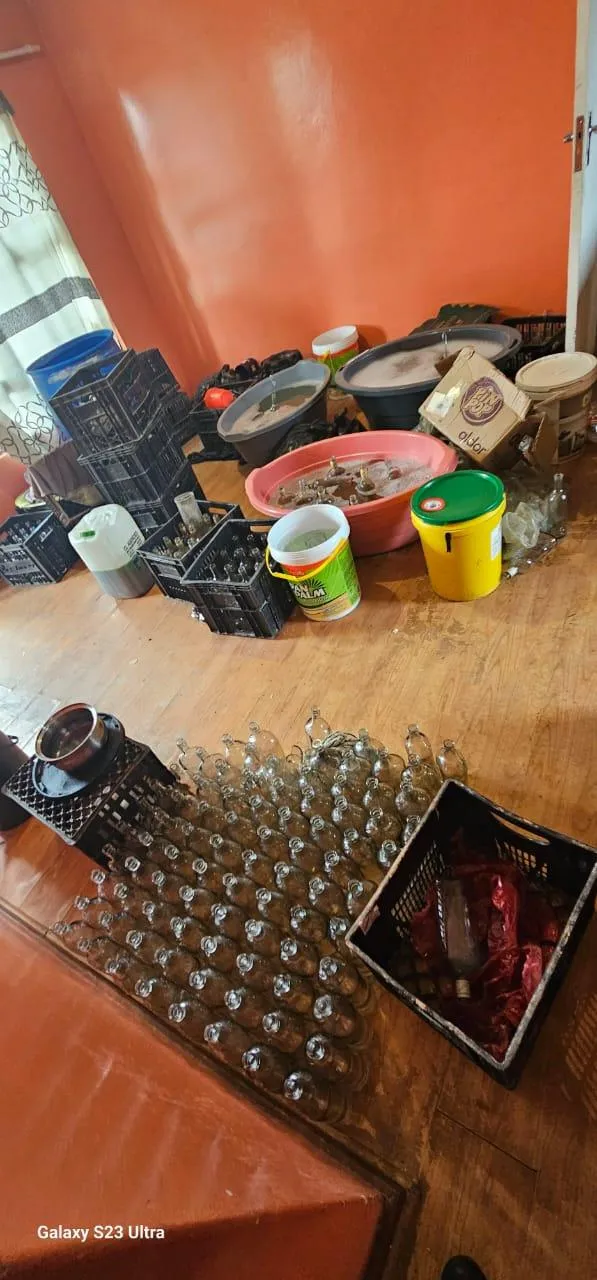
Empty gin bottles and other items were seized by police during the operation against illegal alcohol production.
Image: SAPS
As illicit alcohol continues to deprive many governments of tax revenues and poses a significant threat to businesses and consumers, a Transnational Alliance to Combat Illicit Trade (Tracit) report has encouraged authorities to enforce strict laws and regulations governing the trade of ethanol to prevent its diversion for illegal and unauthorised purposes.
Tracit said this underground market harms the sales and profits of legitimate firms and the economy in general, while also posing major health and safety threats to consumers.
The report stated that to safeguard public health and reduce the risks associated with illicit alcohol, governments should enact and enforce laws and regulations governing the trade of ethanol to prevent its diversion for illegal or unauthorised purposes.
The most successful ethanol control strategies, according to Tracit, employ a three-pillar approach encompassing the creation, implementation, and vigilant monitoring of ethanol control measures, which would disrupt illicit alcohol networks and protect public health.
This includes an ethanol control checklist, designed for use by legislators and regulatory agencies to implement or fortify ethanol control systems.
Ethanol constitutes a significant economic sector worldwide and holds a global market value of approximately $90 billion. It is used for many applications, including automotive transportation fuels, industrial applications, hand sanitizers, cosmetics, pharmaceuticals, and foodstuffs. It is also a major ingredient in the production of alcoholic beverages.
Because alcoholic beverages are heavily taxed, criminals make a profit by producing and selling low-cost, illicit products. One primary method for lowering costs is to secure untaxed suppliers of ethanol from unregulated imports, unregistered ethanol smuggled into the country, ethanol diverted from untaxed industrial applications, and ethanol produced locally in quantities sufficient for commercial sales.
This, according to the report, also impedes governments’ capacity to regulate legally produced alcohol, undermines legitimate, tax-paying businesses by associating their brands with inferior, illicit products, diverts resources to organised crime, and perpetuates illegal activities.
Ethanol smuggling is also a significant and growing component of the illicit alcohol trade in South Africa, costing the government an estimated R16.5 billion in lost tax revenue in 2024, according to the South African Revenue Service (SARS).
Last month, officials from SARS, together with the police, raided a property where they found people transferring a 40 000-litre tanker of ethanol used to produce illicit alcohol into flow-bins for loading onto trucks.
SARS said the ethanol was suspected to be intended for Zimbabwe and that the team discovered more than 92 000 litres of ethanol meant for the production of illegal liquor during the investigation.
The raid also uncovered several additional trucks and drums containing both ethanol and diesel.
According to recent research by the Drinks Federation of South Africa (DFSA), illicit alcohol accounts for an estimated 18% of all alcohol consumed nationally.
The South African Liquor Brand Owners Association (SALBA) said that although some decline has been observed after Covid-19, the market remains highly active and entrenched.
The association said criminal syndicates have become increasingly sophisticated, making enforcement more difficult and highlighting the need for stronger collaboration between the government, industry, and law enforcement.
SALBA spokesperson Kurt Moore said illegal manufacturing operations often operate out of unregistered facilities, using industrial ethanol and rudimentary equipment to produce counterfeit or illicit products.
Moore said illicit traders also target white spirits, which are easier to counterfeit, and their methods are becoming more sophisticated, making detection harder.
“Illicit alcohol accounts for approximately 15–22% of total consumption, with the market valued at around R25.1 billion in 2024, resulting in an estimated R16.5 billion in lost tax revenue. Legitimate businesses also lose sales, investment opportunities, and jobs across the value chain,” said Moore, adding that stricter control of ethanol, ensuring only registered suppliers operate, and tighter oversight of the supply chain from import to distribution, are critical to reducing diversion into illicit production.
He said this must be combined with enforcement, consumer education, and a regulatory environment that promotes compliance.
The Beer Association of South Africa (BASA) said the illicit alcohol trade in South Africa is a serious concern as it also exposes consumers to unsafe, unregulated products.
BASA added that this also discourages investment and fuels organised crime.
“Ethanol is a critical input in the production of illicit alcohol, and tighter controls would significantly disrupt these networks. By closing loopholes, ensuring imports are registered, monitoring industrial applications, and preventing diversion to untaxed, unregulated uses, the government can reduce the supply available to illicit operators. This would protect public health by reducing exposure to toxic, unsafe products, while also safeguarding tax revenue, jobs, and the integrity of South Africa’s formal alcohol industry,” said CEO Charlene Louw.
The National Liquor Traders Council (NTL) spokesperson, Lucky Ntimane, said this means traders and consumers are exposed to dangerous products daily, adding that any intervention to curb the spread of illicit and counterfeit alcohol should be encouraged.
Tracit also added that the problem of illicit alcohol exists in every region, in developed and developing countries, urban and rural areas, and higher-income and lower-income neighbourhoods alike.
Moreover, illicit alcohol is often consumed by more vulnerable populations, such as people of low socioeconomic status, rural populations, and people with alcohol dependence.
Cape Times
Related Topics: